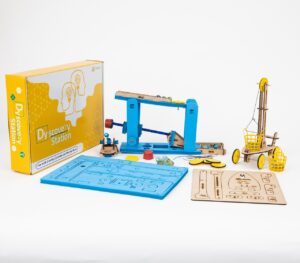The formative years of childhood are critical in laying the foundation for lifetime learning and development. As caregivers and educators seek effective ways to stimulate young minds, the role of kids educational toys has become increasingly significant. This article explores the fundamental importance of educational toys in enhancing early childhood development, elucidating the multifaceted benefits that such playful learning tools bring to the table.
The Impact of Educational Toys on Early Development
Childhood learning is not just confined to the traditional classroom setting. In fact, much of the cognitive, social, and motor skills development occurs through informal play. The integration of educational toys into a child’s environment serves as a catalyst for intellectual growth and creativity, fostering a sense of curiosity and a love for exploration.
Educational toys are designed to target specific developmental milestones, which vary according to the child’s age. From sensory toys that aid in perceptual development to construction sets that enhance spatial skills, each type of toy carries the potential to contribute constructively to a child’s growth journey.
Cognitive Benefits of Kids Educational Toys
When discussing cognitive advancement, educational toys are indispensable. Puzzles, for instance, require children to recognise patterns and shapes, which sharpens their problem-solving abilities and leads to improvements in critical thinking. Similarly, games involving numbers and memory can boost mathematical understanding and cognitive processes related to memory.
Language development, another crucial element of early growth, is also nurtured through interactive toys. Storytelling dolls, alphabet blocks, and electronic gadgets that promote phonetic learning can all play significant roles in enhancing a child’s vocabulary and grasp of language.
Motor Skills Development
Physical coordination and motor skills are fundamental to a child’s overall development, and various kids educational toys uniquely address this area. For example, toys that require manipulation, such as beads that need to be threaded or clay that needs to be modelled, can refine both fine and gross motor skills.
Children develop their fine motor skills – those involving smaller muscle movements – when they engage with toys that necessitate precision and a delicate touch. Conversely, larger toys that encourage whole-body interaction can assist in honing a child’s gross motor abilities, thereby supporting healthy physical development.
Emotional and Social Advantages
Learning to interact with others and manage one’s emotions is just as vital as cognitive and physical growth. Through collaborative play, children learn the value of sharing, patience, and empathy. Toys that facilitate group activities or turn-taking can be remarkable tools for instilling social competencies in young learners.
Moreover, educational toys can also be a conduit for expressing emotions and processing experiences, serving as a source of comfort and a medium for children to explore and express their feelings.
Fostering Creativity and Imagination
Education is not just about absorbing facts; it’s also about fostering creativity and imagination. Creative play is a critical aspect of development, allowing children to dream up new worlds and scenarios, develop storylines, and role-play different characters. Toys such as building blocks, art supplies, and dress-up kits are just a few examples of educational tools that encourage creative thinking.
Through the lens of creativity, children can learn innovation and adaptability – skills that are essential in our ever-changing world. By stimulating their imagination, educational toys can pave the way for a mindset that embraces creativity in problem-solving.
Choosing the Right Educational Toys
Given the variety of toys on the market, selecting the right ones can be a daunting process. Key factors to consider include the child’s interests, age-appropriate challenges, and the underlying learning objectives of the toy. Ensuring a diversity of toys can present a well-rounded developmental experience, covering all domains: cognitive, physical, social, and creative.
When choosing kids educational toys, safety is paramount. Toys must be constructed from non-hazardous materials, free from sharp edges, and designed to prevent swallowing or choking hazards. Age recommendations provided by manufacturers serve as a helpful guide as to what toys are appropriate for different developmental stages.
Concluding Thoughts on Early Development through Play
In conclusion, the importance of educational toys in a child’s development cannot be overstated. The diversity of available toys means that there are endless possibilities for enriching a child’s learning experience outside the confines of structured education. It is through play that children learn most about the world and themselves, an organic process beautifully enhanced by educational toys.
The joy derived from play and the learning that accompanies it is a child’s first encounter with the wonders of the world. Hence, kids educational toys are not just tools for entertainment, but also instruments that nurture the heart and mind, preparing youngsters for the adventures of life ahead.
Ultimately, investing in quality educational toys is not merely a purchase; it’s an investment in a child’s future. By selectively providing toys that engage, educate, and inspire, caregivers can significantly improve the prospects of comprehensive early development in children, setting them on a path to lifelong learning and success.





